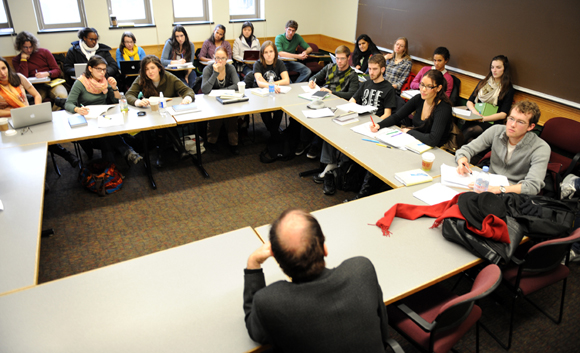| Sun | Mon | Tue | Wed | Thu | Fri | Sat |
|---|---|---|---|---|---|---|
| 1 | 2 | 3 | 4 | 5 | ||
| 6 | 7 | 8 | 9 | 10 | 11 | 12 |
| 13 | 14 | 15 | 16 | 17 | 18 | 19 |
| 20 | 21 | 22 | 23 | 24 | 25 | 26 |
| 27 | 28 | 29 | 30 | 31 |
CATEGORIES
RECENT ENTRIES
BLOG ROLL
Proportion control

In the five weeks Albie Sachs spent on campus as a visiting professor, lecturing and teaching on South African constitutional law and what it has to say about same-sex marriage, torture, terrorism, and socioeconomic rights, it was hard to resist comparisons to the United States and how those same issues have been handled here. In his classroom discussions, Sachs—who helped write the South African constitution in the 1990s before becoming a constitutional-court justice—invited students to explore those comparisons. What is the American concept of justice? What does the constitution say about housing rights and religious freedom and the societal role of criminal punishment?
In a late January class on the second floor of Cobb Hall, Sachs laid out one fundamental difference he sees between South Africa’s constitutional philosophy and America’s: “proportionality.”
“It’s the theme of balancing,” he said. “Years ago I met a judge from Denmark, Isi Foighel, who was on the European Court of Human Rights. He said, 'You know, there's a very interesting thing you’ll notice on that court: the judges of southern Europe think their job is to distinguish between justice and injustice, right and wrong, lawful and unlawful. But the judges of northern Europe think that their main function is to regulate competing claims of right, when the case is not between right and wrong, but right and right.' Neither claim is invalid, but you have to find balance. It’s a very different crisis of reasoning.”
A similar difference exists, Sachs explained, between South Africa and the United States. In this country, he said, judges look to decipher right and wrong, lawful and unlawful. South Africa's judges think more like northern Europeans. He pointed to two cases as examples: a Rastafarian lawyer in Johannesburg denied admittance to the bar unless he swore off marijuana, and two Oregon Native Americans denied unemployment after being fired for eating peyote. Both filed suit, claiming the drugs as an important ritual elements of their religious exercise. Each claim went all the way to its country's high court, and in the end each was denied. Justice Scalia wrote the majority opinion in the Oregon case, arguing that religion doesn't give a citizen the right to disobey generally applicable laws: "To permit this would be to make the professed doctrines of religious belief superior to the law of the land, and in effect to permit every citizen to become a law unto himself."
In South Africa, the Constitutional Court's justices took a slightly different approach. They would not have been unhappy, Sachs said, to recognize Rastafarians' marijuana usage for religious reasons, but they determined that regulating the drug was unfeasible. (Sachs, who wrote the minority opinion in the case, disagreed on the issue of feasibility; he saw a way, he said, that it could have been done.) But their calculations were not so simple as figuring out who was wrong, which claim was outside the law.
In the United States, Sachs said, the term "proportionality" isn't often used. But increasingly it may be. “In a modern, diverse, pluralist society, those are the cases”—right versus right, not right versus wrong—“that are coming before the top courts. You’re not simply classifying, establishing a rule through classification. You’re not saying, ‘The rule applies or doesn’t apply.’ It’s balancing; it’s proportionality. It's weighing up, for example, the state interest in controlling the supply of drugs as against the intensity of the religious belief and its meaning for the adherents.”
Lydialyle Gibson
March 27, 2010
